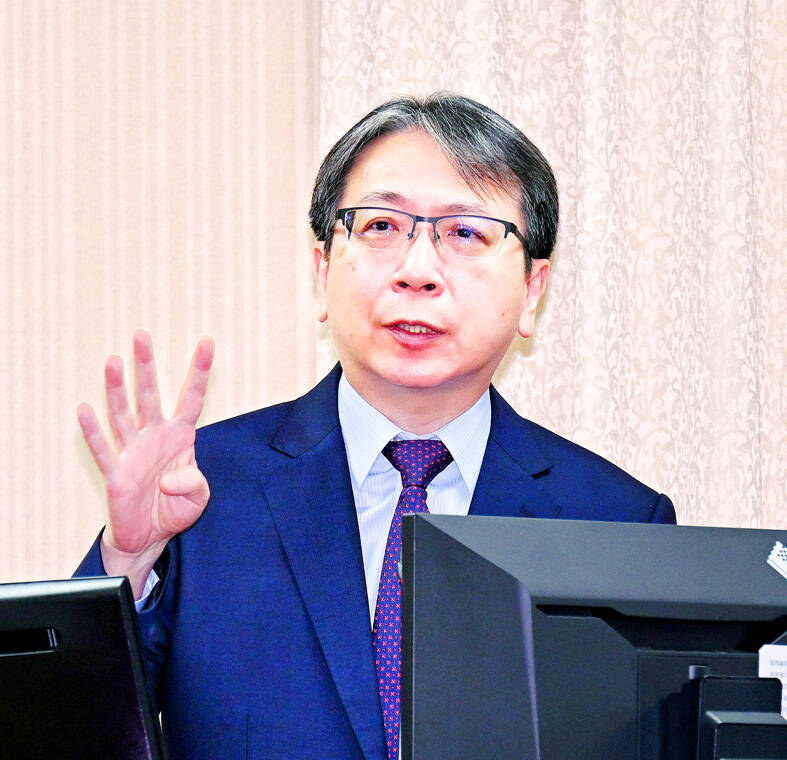The government would closely monitor Chinese spouses who have been coordinating with the Chinese Communist Party (CCP) to engage in “united front” work against Taiwan, or have been receiving funding from the CCP to establish pro-unification organizations, National Security Bureau Director-General Tsai Ming-yen (蔡明彥) said yesterday.
“The bureau’s position is very clear. We respect Chinese spouses as long as they engage in legal activities in Taiwan, but we will closely monitor those who have been coordinating with the Chinese government on united front work against Taiwan, hosting cross-strait exchanges for political purposes and receiving sponsorships from Beijing to establish pro-unification groups,” Tsai told reporters before attending a meeting of the legislature’s Foreign Affairs and National Defense Committee.
“If there is substantial evidence showing that they are agents for the Chinese government, we would turn the case over to the justice system to be investigated,” he said.

Photo: Fang Pin-chao, Taipei Times
Activities of Chinese spouses in Taiwan came under scrutiny after the Taiwan People’s Party was reported to be considering listing Taiwan New Residents Development Association chairwoman Xu Chunying (徐春鶯) as one of the party’s legislators-at-large.
A video circulating online shows her and a group of Chinese who have married Taiwanese wearing scarves resembling those worn by China’s Red Guards in the 1960s and singing the praise of former Chinese leader Mao Zedong (毛澤東).
Xu defended herself on Sunday, saying she was never a member of the Chinese Communist Party (CCP) or the Communist Youth League of China.
Tsai yesterday said that some heads of polling companies and academics are visiting China at the CCP’s invitation, and some polling companies’ funding comes from Chinese capital.
The bureau is investigating these money flows, he added.
If visits to China by academics and political commentators are “normal exchanges,” the bureau would not intervene, Tsai said.
However, if there are “abnormal situations, the bureau is keeping an eye,” he said, without elaborating.
China is using various methods to interfere in January’s presidential and legislative elections, Tsai said.
For example, misinformation in the form of short video clips generated by artificial intelligence is circulating on social media, he said.
Groups and political commentators are also being invited to attend forums in China, which the CCP is filming and circulating online, Tsai said.
Asked by Democratic Progressive Party Legislator Liu Shyh-fang (劉世芳) whether the bureau can release the names of these political commentators, Tsai said that it has the online situation under control.
Once presidential hopefuls officially register their candidacies and launch their election campaigns, people suspected of irregularities would be investigated for contravening the Anti-infiltration Act (反滲透法), he added.

Chinese Nationalist Party (KMT) Chairman Eric Chu (朱立倫), spokeswoman Yang Chih-yu (楊智伃) and Legislator Hsieh Lung-chieh (謝龍介) would be summoned by police for questioning for leading an illegal assembly on Thursday evening last week, Minister of the Interior Liu Shyh-fang (劉世芳) said today. The three KMT officials led an assembly outside the Taipei City Prosecutors’ Office, a restricted area where public assembly is not allowed, protesting the questioning of several KMT staff and searches of KMT headquarters and offices in a recall petition forgery case. Chu, Yang and Hsieh are all suspected of contravening the Assembly and Parade Act (集會遊行法) by holding

PRAISE: Japanese visitor Takashi Kubota said the Taiwanese temple architecture images showcased in the AI Art Gallery were the most impressive displays he saw Taiwan does not have an official pavilion at the World Expo in Osaka, Japan, because of its diplomatic predicament, but the government-backed Tech World pavilion is drawing interest with its unique recreations of works by Taiwanese artists. The pavilion features an artificial intelligence (AI)-based art gallery showcasing works of famous Taiwanese artists from the Japanese colonial period using innovative technologies. Among its main simulated displays are Eastern gouache paintings by Chen Chin (陳進), Lin Yu-shan (林玉山) and Kuo Hsueh-hu (郭雪湖), who were the three young Taiwanese painters selected for the East Asian Painting exhibition in 1927. Gouache is a water-based

Taiwan would welcome the return of Honduras as a diplomatic ally if its next president decides to make such a move, Minister of Foreign Affairs Lin Chia-lung (林佳龍) said yesterday. “Of course, we would welcome Honduras if they want to restore diplomatic ties with Taiwan after their elections,” Lin said at a meeting of the legislature’s Foreign Affairs and National Defense Committee, when asked to comment on statements made by two of the three Honduran presidential candidates during the presidential campaign in the Central American country. Taiwan is paying close attention to the region as a whole in the wake of a

OFF-TARGET: More than 30,000 participants were expected to take part in the Games next month, but only 6,550 foreign and 19,400 Taiwanese athletes have registered Taipei city councilors yesterday blasted the organizers of next month’s World Masters Games over sudden timetable and venue changes, which they said have caused thousands of participants to back out of the international sporting event, among other organizational issues. They also cited visa delays and political interference by China as reasons many foreign athletes are requesting refunds for the event, to be held from May 17 to 30. Jointly organized by the Taipei and New Taipei City governments, the games have been rocked by numerous controversies since preparations began in 2020. Taipei City Councilor Lin Yen-feng (林延鳳) said yesterday that new measures by